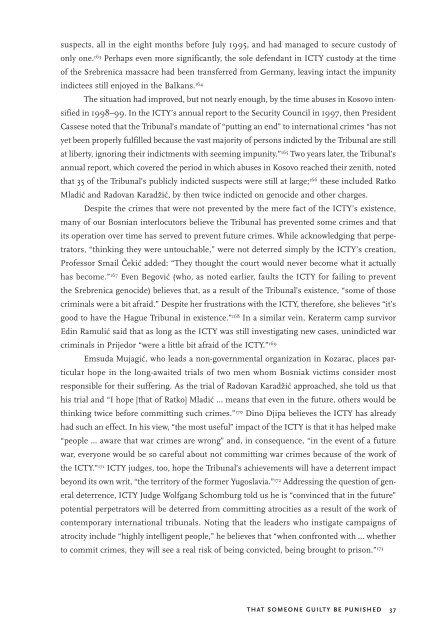That Someone Guilty Be Punished - International Center for ...
That Someone Guilty Be Punished - International Center for ...
That Someone Guilty Be Punished - International Center for ...
Create successful ePaper yourself
Turn your PDF publications into a flip-book with our unique Google optimized e-Paper software.
suspects, all in the eight months be<strong>for</strong>e July 1995, and had managed to secure custody of<br />
only one. 163 Perhaps even more significantly, the sole defendant in ICTY custody at the time<br />
of the Srebrenica massacre had been transferred from Germany, leaving intact the impunity<br />
indictees still enjoyed in the Balkans. 164<br />
The situation had improved, but not nearly enough, by the time abuses in Kosovo intensified<br />
in 1998–99. In the ICTY’s annual report to the Security Council in 1997, then President<br />
Cassese noted that the Tribunal’s mandate of “putting an end” to international crimes “has not<br />
yet been properly fulfilled because the vast majority of persons indicted by the Tribunal are still<br />
at liberty, ignoring their indictments with seeming impunity.” 165 Two years later, the Tribunal’s<br />
annual report, which covered the period in which abuses in Kosovo reached their zenith, noted<br />
that 35 of the Tribunal’s publicly indicted suspects were still at large; 166 these included Ratko<br />
Mladić and Radovan Karadžić, by then twice indicted on genocide and other charges.<br />
Despite the crimes that were not prevented by the mere fact of the ICTY’s existence,<br />
many of our Bosnian interlocutors believe the Tribunal has prevented some crimes and that<br />
its operation over time has served to prevent future crimes. While acknowledging that perpetrators,<br />
“thinking they were untouchable,” were not deterred simply by the ICTY’s creation,<br />
Professor Smail Čekić added: “They thought the court would never become what it actually<br />
has become.” 167 Even <strong>Be</strong>gović (who, as noted earlier, faults the ICTY <strong>for</strong> failing to prevent<br />
the Srebrenica genocide) believes that, as a result of the Tribunal’s existence, “some of those<br />
criminals were a bit afraid.” Despite her frustrations with the ICTY, there<strong>for</strong>e, she believes “it’s<br />
good to have the Hague Tribunal in existence.” 168 In a similar vein, Keraterm camp survivor<br />
Edin Ramulić said that as long as the ICTY was still investigating new cases, unindicted war<br />
criminals in Prijedor “were a little bit afraid of the ICTY.” 169<br />
Emsuda Mujagić, who leads a non-governmental organization in Kozarac, places particular<br />
hope in the long-awaited trials of two men whom Bosniak victims consider most<br />
responsible <strong>for</strong> their suffering. As the trial of Radovan Karadžić approached, she told us that<br />
his trial and “I hope [that of Ratko] Mladić … means that even in the future, others would be<br />
thinking twice be<strong>for</strong>e committing such crimes.” 170 Dino Djipa believes the ICTY has already<br />
had such an effect. In his view, “the most useful” impact of the ICTY is that it has helped make<br />
“people … aware that war crimes are wrong” and, in consequence, “in the event of a future<br />
war, everyone would be so careful about not committing war crimes because of the work of<br />
the ICTY.” 171 ICTY judges, too, hope the Tribunal’s achievements will have a deterrent impact<br />
beyond its own writ, “the territory of the <strong>for</strong>mer Yugoslavia.” 172 Addressing the question of general<br />
deterrence, ICTY Judge Wolfgang Schomburg told us he is “convinced that in the future”<br />
potential perpetrators will be deterred from committing atrocities as a result of the work of<br />
contemporary international tribunals. Noting that the leaders who instigate campaigns of<br />
atrocity include “highly intelligent people,” he believes that “when confronted with ... whether<br />
to commit crimes, they will see a real risk of being convicted, being brought to prison.” 173<br />
THAT SOMEONE GUILTY BE PUNISHED 37

















